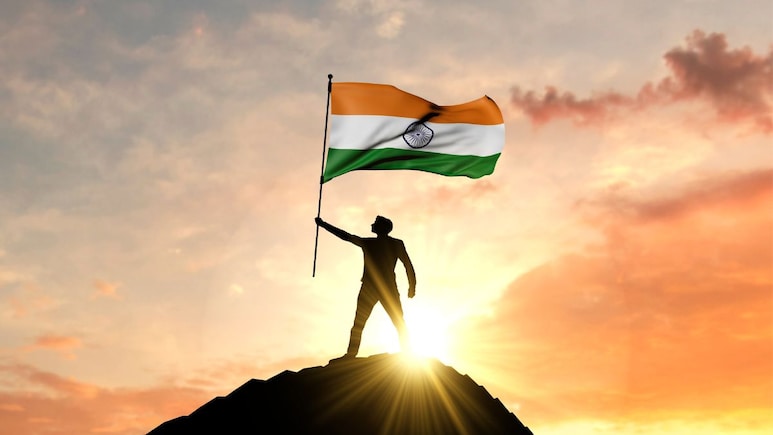
India is celebrating its 79th Independence Day this year as it marks the nation's liberation from over two centuries of British colonial rule in 1947. It is not only a symbol of political freedom but also a turning point in the social, cultural, and scientific development of the country. It gave birth to the vision of a modern India where sectors like education, healthcare, agriculture, and science could grow in ways that served the nation's unique challenges. Which is why significance of Independence Day also extends deeply into the medical field. Before 1947, India's healthcare system was underdeveloped, heavily urban-centric, and largely inaccessible to the rural majority. Colonial health policies primarily aimed to protect British officials and soldiers rather than the Indian population.
During the freedom struggle, doctors were not merely healers but also agents of change and resistance. Many used their medical expertise to support injured protestors, treat revolutionaries in hiding, and provide medical aid in rural areas neglected by the colonial administration. For them, medicine was not just a profession but a tool for empowerment and nation-building. Some refused to serve in colonial hospitals, instead dedicating their skills to nationalist causes.
Their clinics often became hubs of political discussion and mobilisation. By advocating for health as a fundamental right, they helped lay the groundwork for the idea that true independence included freedom from disease, poverty, and neglect. They played a notable role in facilitating freedom through their medical service and their passionate steps to fight for the nation. Below we share few of the many heroic doctors who played a crucial role in helping India achieve freedom.
Doctors who played a monumental role in India's independence:
1. Dr. Bidhan Chandra Roy
Dr. Bidhan Chandra Roy was one of India's most renowned physicians and a former Chief Minister of West Bengal, was both a respected freedom fighter and a close associate of Mahatma Gandhi, whom he had personally treated. His leadership in Bengal's Civil Disobedience Movement led to his arrest and imprisonment by the British. In recognition of his service to the nation, he was later honoured with the Bharat Ratna, and his birth anniversary is commemorated as Doctors' Day in India.
2. Captain Laxmi Sehgal
Captain Laxmi Sehgal was born in Malabar, earned her MBBS from Madras Medical College in 1938 and went on to obtain a diploma in gynaecology. Her life took a revolutionary turn when she moved to Singapore, where she met Netaji Subhas Chandra Bose. Entrusted with creating the women's wing of the Azad Hind Fauj, she rose to the rank of “Captain” and led her battalion into Burma to fight against British forces. After India's independence, she settled in Kanpur, dedicating herself to medical service as a practising gynaecologist.
3. Dr. Bhogaraju Pattabhi Sitaramayya
Dr. Bhogaraju Pattabhi Sitaramayya graduated from Madras Christian College, built a flourishing medical practice in present-day Andhra Pradesh. However, his dedication to the nation's cause outweighed personal ambitions. He became an active member of the Andhra Congress Committee and later served in the All India Congress Committee. His participation in the Quit India Movement of 1942 led to a three-year imprisonment by the British.
4. Dr. Muthulakshmi Reddy
Dr. Muthulakshmi Reddy was a brilliant alumna of Madras Medical College, earned multiple honours and medals during her medical education. Although she had a promising career in medicine ahead of her, she chose to devote herself to the independence movement, inspired by leaders like Sarojini Naidu and Mahatma Gandhi. After freedom was won, she channelled her commitment to social service into healthcare, founding the Adyar Cancer Institute which is today one of India's leading cancer treatment centres.
5. Dr. Jadugopal Mukherjee
Known more popularly as an associate of revolutionary Bagha Jatin and the leader of the Jugantar movement in Bengal, Dr. Jadugopal Mukherjee studied at the Calcutta Medical College in 1908. However, he discontinued his studies as he became more active in the freedom struggle. In 1921, he had to obtain a special permission to sit for his medical degree examination, but passed it with flying colours in 1922. In the 1920s and hence, Dr. Jadugopal Mukherjee united Jugantar with the Indian National Congress, and continued to be a part of the mainstream freedom struggle. And yet, his legacy as a doctor who treated tuberculosis patients in Ranchi is equally prominent.
6. Dr. M.A. Ansari
While most people remember Dr. Mukhtar Ahmed Ansari as one of the founders and chancellors of Delhi's Jamia Millia Islamia University, and a close associate of Mohandas Karamchand Gandhi, what many don't know is this freedom fighter's contributions to the field of medicine. Dr. Ansari obtained his medical degree from Madras Medical College, and went to England to study for his M.D. and M.S. degrees. One of the leading medical students at London Lock Hospital and Charing Cross Hospital, he earned fame as a urologist-in fact, Charing Cross Hospital still has an Ansari Ward. His medical legacy is firmly placed in his book, Regeneration Of Man.
In essence, India's Independence Day is a reminder that freedom is multifaceted. It includes political autonomy, cultural identity, and the right to health and wellbeing. The doctors of that era understood this deeply. They fought not only against foreign rule but also against the sickness and inequality that weakened the country from within. Their legacy continues in the modern Indian healthcare system, which strives to uphold the vision of a healthier, freer, and more self-reliant nation.
Disclaimer: This content including advice provides generic information only. It is in no way a substitute for a qualified medical opinion. Always consult a specialist or your own doctor for more information. NDTV does not claim responsibility for this information.
Track Latest News Live on NDTV.com and get news updates from India and around the world

